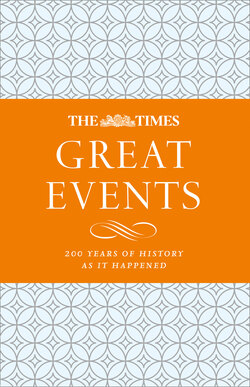Читать книгу The Times Great Events - Группа авторов - Страница 30
ОглавлениеTHE FIRST TEST CRICKET SERIES
14 May 1877
You know the result of our great cricket match. Australians will “blow,” to use Mr. Trollope’s word, about it for some time to come. It was played on the ground of the Melbourne Club, between Lillywhite’s eleven and a combined eleven of New South Wales and Victoria. We are told that it is the first match in which an English professional eleven has been beaten out of England. Each side was under a certain disadvantage. Pooley, the English wicket keeper, had been left in New Zealand, and Allan, the best Victorian bowler, upon whose services the colonial eleven almost entirely depended in his department, suddenly retired, and a substitute had to be found at the last moment. The betting was all together in favour of the Englishmen before the match began, but the splendid play of Bannerman, from New South Wales, soon altered the odds. He made 165 runs before he retired, not out, with his finger badly cut. The Englishmen declared that they had never seen a finer display of batting, not even by the great Grace. The other Australians brought up the score in the first innings to 245. The Englishmen then went in and made 196. The Australians followed and, with Bannerman disabled, made 104, leaving the Englishmen 155 to make to win, and a most interesting game was brought to a close with the fall of their last wicket for 108 runs, leaving our men the winners by 45 runs. This victory is certainly creditable to Australia. The scores were made against presumably the best English bowlers, among whom were Shaw, Emmett, Ullyet, and Southerton, the fielding of the team was excellent, and, although it is considered relatively weak in batsmen, Jupp, Charlwood, Greenwood, and Selby are said to be strong enough to give, at least, an average efficiency. As may be supposed, the game was watched with intense excitement by enthusiastic crowds, and those who could not get to the ground clustered round the newspaper offices to see the last despatches from the seat of war placarded on the door posts. It began and ended in good temper, and Lillywhite’s pecuniary success must have consoled him for his defeat.
The Times had ignored the staging of the first international football match, between England and Scotland, in 1872, but the gentleman’s favoured game of cricket was another matter.
English teams had toured abroad for many years – a trip to France in 1789 had to be abandoned when the Revolution broke out – but the matches played in Australia by James Lillywhite’s side in March and April 1877 are retrospectively regarded as the first Tests.
A rival tour organized by W. G. Grace’s brother had been cancelled at short notice and Lillywhite’s team of professionals featured few of the leading English players, such as Grace. The wicket keeper, Ted Pooley, had been left behind in New Zealand after being accused of an assault arising from his betting on a game he had been umpiring.
The Australian side similarly lacked their finest bowler of the era, Fred Spofforth, while most of their players had been born in England. Nonetheless, 12,000 spectators at the Melbourne Cricket Ground, among them this Australian correspondent, were delighted by Charles Bannerman’s feat of compiling what is still the highest percentage of a team’s runs in a Test innings. The sporting rivalry instituted between the two nations gave rise to The Ashes five years later.
